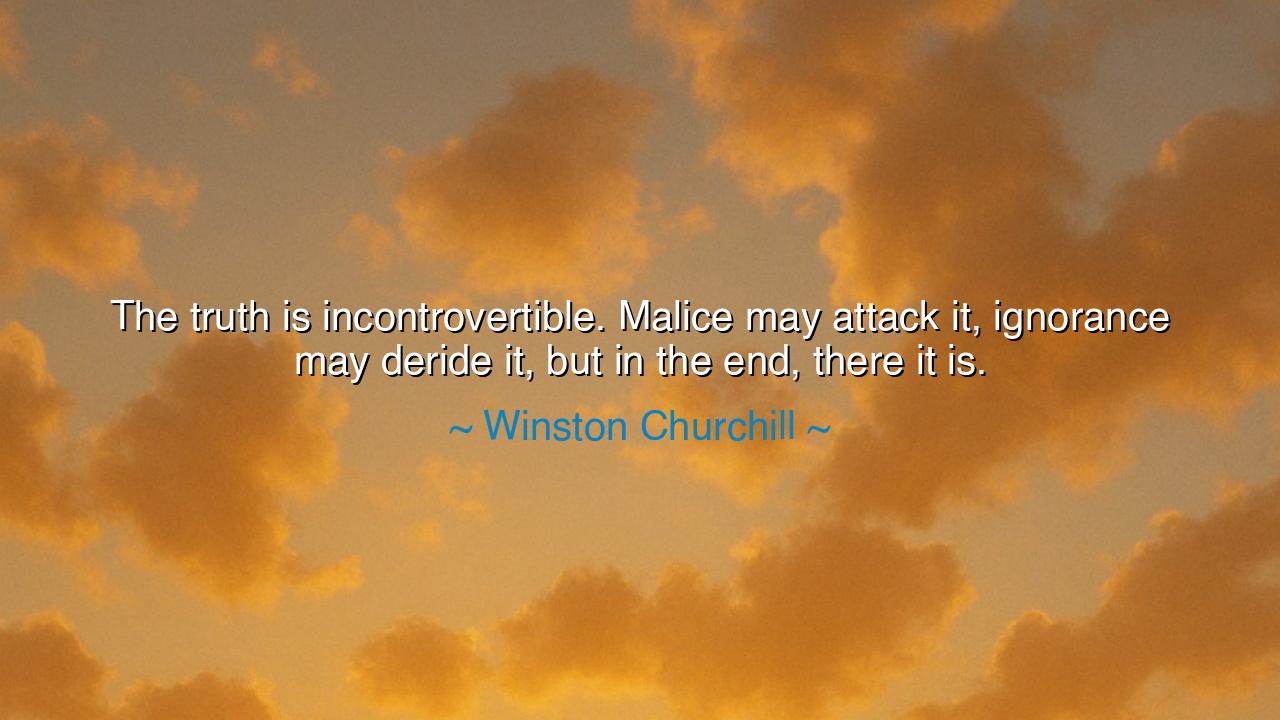
The truth is incontrovertible. Malice may attack it, ignorance
The truth is incontrovertible. Malice may attack it, ignorance may deride it, but in the end, there it is.






Winston Churchill, that lion of words and iron-willed defender of his people, once spoke with the thunder of certainty: “The truth is incontrovertible. Malice may attack it, ignorance may deride it, but in the end, there it is.” In this mighty declaration, he reminds us that truth is eternal and unbreakable. Though men may sneer at it, deny it, or try to bury it under hatred or folly, truth stands unmoved, like a mountain battered by storms yet never crumbling. It is the one thing that does not perish under the assaults of time and deceit.
The origin of this wisdom can be traced to Churchill’s life in the crucible of war and politics. He knew how often truth is the first casualty in human conflict, obscured by propaganda, by cowardice, by willful blindness. During the dark days of World War II, many voices urged compromise with tyranny, or comforted themselves with lies about peace when war was inevitable. But Churchill stood firm, insisting that the truth of Hitler’s threat could not be ignored. Malice mocked him, ignorance scorned him, yet when the bombs fell and the armies marched, his warnings were revealed as truth itself—unyielding, undeniable, incontrovertible.
History gives us countless proofs of his insight. Consider the trial of Galileo Galilei, who was forced by the Church to renounce the truth that the earth moves around the sun. Malice attacked him, ignorance derided him, yet centuries later, truth stood revealed in all its grandeur: the planets do not circle the earth. Or consider Nelson Mandela, branded a traitor and terrorist by those who feared him, imprisoned for decades. Malice sought to destroy him, ignorance scorned his vision of equality. But when the chains were broken, truth rose triumphant: apartheid was wrong, justice could not be denied. In the end, there it was.
Churchill’s words also strike at the heart of human weakness. Too often we think we can destroy truth by refusing to see it. Men cover it with lies, hoping the lie will become reality. They mock it with laughter, thinking ridicule will erase it. They attack it with hatred, as though violence could shatter what is eternal. But truth is not fragile. It is patient, and though it may be obscured for a season, it always returns, for reality cannot be undone. To live against truth is to live in illusion, and illusion cannot endure.
There is also a heroic encouragement in this teaching. For those who suffer for speaking truth, Churchill’s words are a shield. The one who speaks truth may be hated, derided, even cast out, yet he stands with the eternal. The winds of mockery may howl, the fires of malice may rage, but in the end, when all pretenses are stripped away, truth remains. To align yourself with truth, however difficult, is to plant your feet on solid ground. To align yourself against it, however convenient, is to build on sand that must collapse.
The lesson for us is clear: cling to truth, even when it is unpopular, even when it costs you dearly. Do not be swayed by the jeers of ignorance or the venom of malice. Ask yourself not, “Is this convenient?” or “Will this make me liked?” but “Is this true?” And when you find the answer, stand by it, for in the end, truth will endure, while all else fades.
Practically, this means living with integrity in both small and great matters. Speak honestly, even when silence or falsehood seems easier. Seek facts rather than flattering illusions. When you are tempted to distort reality to suit your desires, remember Churchill’s warning: you may delay truth, but you cannot destroy it. Better to align with it early, and walk in its strength, than to fight against it and be broken by it.
Thus, Churchill’s words resound like a bell across the ages: “The truth is incontrovertible… in the end, there it is.” Let us take courage in this unyielding reality. For if truth is eternal, then those who defend it stand with eternity itself. And though malice may rage and ignorance may scoff, their laughter and their venom will pass away—but truth, like the sun after a storm, shall rise again, unbroken, radiant, and victorious.






HTTran Thi Huyen Trang
This quote speaks to the tenacity of truth, but I wonder, how often do we face situations where we prefer to turn a blind eye to the truth? Malice and ignorance are easy to recognize, but sometimes, truth can be hard to confront. Are we truly prepared for the weight of truth when it finally stands in front of us, undeniable and unchangeable?
HTNguyen Huyen Trang
The way Churchill emphasizes the unshakable nature of truth is compelling, but is it always as straightforward as he suggests? What if people interpret the truth in different ways, or if the 'truth' changes over time as we learn more? Does truth truly remain incontrovertible, or is it constantly evolving with new knowledge and perspectives?
MPNguyen Mai Phuong
Churchill's quote is a reminder of the resilience of truth. Even when met with malice or ignorance, it stands strong. But is there a limit to how much truth a society can handle? Sometimes, the truth feels like a burden, and some might wish to ignore it for comfort's sake. How do we strike a balance between accepting truth and maintaining peace?
AFATUAN FOOD
This quote seems to highlight the undeniable power of truth. Despite how people may try to distort or ignore it, truth ultimately prevails. But can the relentless pursuit of truth create division among people? Does it require us to confront uncomfortable realities that we may not be ready to face? It's interesting to think about how truth, no matter how evident, often faces opposition, and yet it endures.